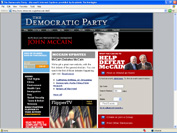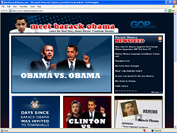

www.democrats.org/johnmccain.html
| A presidential
campaign is
a vast exercise in communications. Personal encounters are
usually
most telling in shaping impressions of a candidate, but a candidate can
only meet so many people first-hand and must get his or
her message out to a wider audience through an infinite variety of free
media opportunities and paid advertising.
Among the possibilities for paid
media, depending on its budget, a
campaign can
run ads on broadcast or cable television, on radio stations with
varying
formats,
it can run print ads in national, local or community newspapers or in
magazines, it can put ads on the
Internet, it can print up nice, glossy brochures or less expensive
flyers, it can do direct mail or robocalls, or it can put up a billboard (or even a virtual
billboard as the Obama
campaign did in October 2008 on internet video games+).
|
PAID
MEDIA GENERAL ELECTION TV and Radio Ads: Convention to Present | Interest Groups Blog Ads: Democrats | Republicans | Interest Groups Direct Mail: In with all the bills, magazines and catalogs Robocalls: Ring-Ring Print Ads: Democrats | Interest Groups PRIMARIES TV and Radio Ads: Democrats | Republicans | Interest Groups | Anuncios en Español | early Blog Ads: Democrats | Republicans Print Ads: Democrats | Republicans | Interest Groups Billboards: Democrats | Republicans | Interest Groups Websites: Democrats | Republicans Literature: Democrats | Republicans |
In terms of free media, a candidate may
deliver a formal policy
speech at a think tank in Washington or New York, hold a town hall
meeting
outside the Beltway, write a book and do a book tour, make a
photo-friendly
visit to a significant location such as the border or an energy plant,
or even stop in for an impromptu visit to a local cafe. Some
candidates
are better communicators than others. Because the candidate
cannot
go everywhere, the campaign will sometimes send surrogates, generally
family
members, elected officials or celebrities. A candidate's wife can
be a particularly effective ambassador for the candidate. The
campaign can generate free media as well, for example by rolling out a
coalition, doing a canvass or posting an edgy video on its website.
In determining what the message he or she wishes to convey, a candidate starts with his or her individual experience, intelligence and values and has input from a team of trusted advisors. Paid consultants may weigh in to determine how the message should be presented, i.e. what medium, what approach (serious and straightforward, humorous, dramatic...) Consultants at times seem to be ubiquitous and some argue that they have changed campaign discourse for the worse.
The effectiveness of the message
depends
on such factors as timing (what other events are happening in the
world),
the medium used, and the receptivity of the audience.1 In contrast to robocalls, which can get
annoying a call or visit from a neighbor, supporter or campaign staffer
can be effective.2
Even small
features such as the logo
or typeface a campaign uses or the musical zing at the end of an ad
can
make a difference. With more
and more Americans using the Internet to obtain news and information
about politics3,
campaigns are devoting more resources to this medium4, 5.
Of course,
the candidate and the campaign are not the only ones communicating;
competing
campaigns, interest groups and the political parties are as well, and
the
media are picking up and reporting these messages.
 |
 |
6/22/08 | |
| DNC- "John McCain Resource
Center" www.democrats.org/johnmccain.html |
RNC-Meet Barack Obama
www.meetbarackobama.com
|
RESOURCES AND REPORTS
techPresident
- "started by Andrew Rasiej and Micah Sifry as a new group blog that
covers
how the 2008 presidential candidates are using the web, and vice versa,
how content generated by voters is affecting the campaign." (launched
late
Jan. 2007)
Pew Research Center: Reports on Election '08
ClickZ News: Campaign '08 - "The ClickZ Network is the largest resource of interactive marketing news, information, commentary, advice, opinion, research, and reference in the world, online or off-." Note: Kate Kaye, who as senior news editor at ClickZ created the "Campaign '08" section, authored a book: CAMPAIGN '08: A Turning Point for Digital Media. (CreateSpace/On-Demand Publishing LLC, Feb. 2009)
Annenberg Public Policy Center of the
University of Pennsylvania:FactCheck.org - "a nonpartisan, nonprofit, "consumer
advocate" for voters that aims to reduce the level of deception and
confusion in
University of Wisconsin Advertising Project - "Using data obtained from the TNS
Media Intelligence Campaign Media Analysis Group (TNSMI/CMAG), the
University of Wisconsin Advertising Project codes and analyzes nearly
all of the political advertising that is aired in 2008 federal and
gubernatorial races across the country. The Ad Project, considered the
single most important and credible source of information on campaign TV
advertising, is funded in 2008 by a grant from the Joyce Foundation."
Stanford University:
Political Communication Lab
Museum of the Moving Image: The
Living Room Candidate
see also:
YouTube's "You
Choose '08" (announced
March 1, 2007)
MySpace's "Impact"
(announced March 18, 2007)
Conference Calls: 2008Central.net
and:
Nielsen, Rasmus Kleis.
Forthcoming [summer 2009]. The Labors of Internet-Assisted
Activism:
Overcommunication, Miscommunication, and Communicative Overload. Journal of Information Technology &
Politics. >
OLDER NOTES AND RESOURCES FROM THE
PRIMARIES
Politics
@ 30 frames per second - blog by J.R.W. of Toledo, OH. (through
April 2008).
oh-ate.com
- "a plethora of presidential propaganda, piped promptly and
publicly..." (discontinued)
-Opposition
Research:
Viewing the World Through Mud Colored Glasses
In January 2007, as the
field of candidates started to gel, the DNC sent out at least 23
press releases targeting Republican presidential prospects.
Former
Gov. Mitt Romney, whom the DNC tagged "smooth talking Mitt," led with
seven,
followed by McCain with six. The RNC, perhaps a bit stunned by
setbacks
in the 2006 mid-term elections, was a bit slower to start, but on Feb.
21, 2007 presented "Meet
The Democrat Candidates." Frontrunner Sen. Hillary Rodham
Clinton,
for example, is labeled as "A Calculating, Divisive, Lifelong Liberal
With
Political Baggage. This kind of activity was going on even
earlier,
in 2005-06, as state parties kept an eye on and started to label
potential
candidates from the opposing party. [press
releases] These "first swipes" gave a sense of the potential
candidates' vulnerabilities. With the 2006 midterm elections out
of the way the parties have geared up their opposition research
offerings.
[another
example]
-Announcing...
There are many different
ways a candidate can announce his or her candidacy. One approach
is to s-t-r-e-t-c-h - i-t - o-u-t. For example, several
presidential
prospects went on one or another of the Sunday morning shows and
announced
they planned to launch an exploratory committee later in the week or
the
month. That generated some news. Then the actual formation
of the exploratory committee may generate further news. Sens.
Obama
and Clinton and Gov. Richardson announced formation of their
exploratory
committees in January 2007 via videos on their websites. An
exploratory
committee is itself a non-essential step since it basically functions
as
a campaign committee. Sen. Dodd, for example, skipped the
exploratory
committee and announced his candidacy, curiously, on "Imus in the
Morning."
Once the candidate finishes the exploratory phase, his or her formal
announcement
will generate more news. Candidates' formal announcement speeches
can significant events, delivered in symbolic locations, with the
family
on the stage and friends and acquaintances from childhood days in the
audience,
wherein a candidate sets the tone and themes of the campaign.
>>
-Miscellany
Supporters
and Opponents on the Web: Early Activity
2006
Commencement Addresses by Potential 2008 candidates (May 2006).
2005
Commencement Addresses by Potential 2008 candidates (May 2005).
Several Creative Communications from 2005
| Copyright © 2006, 2007, 2008, 2009 Eric M. Appleman/Democracy in Action |
 |